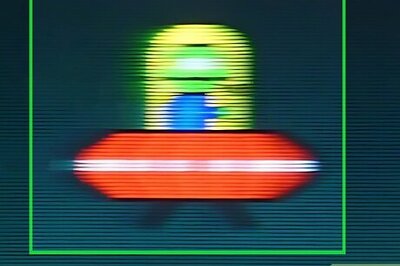
views
Manama: About 10,000 opposition protesters took to the streets of Bahrain on Friday to push their demands for political change two days before the Formula One Grand Prix that puts the Gulf Arab kingdom in the international spotlight. The atmosphere was largely peaceful as groups of men, women and children carrying Bahraini flags walked down a highway and converged at a rallying point, witnesses said.
But a handful of youths in Duraz village temporarily blocked a highway with burning tyres, sending black smoke into the air. Police cleared the tyres to allow traffic through. Wood, sticks and bricks blocked another street nearby, witnesses said.
Anti-government protesters and security forces also clashed overnight, with the demonstrators setting tyres ablaze on roads and police firing tear gas and stun grenades, the BBC reported. Opposition activist Ala'a Shehabi told Reuters she believed violence took place in about 10 to 15 Shi'ite villages overnight but she could give no other details.
Many in the Shi'ite Muslim-majority state accuse the Sunni-led government of trying to use Sunday's race to paper over human rights abuses and disguise political problems they say still plague the country, a close U.S. ally. The opposition hopes the spotlight on the kingdom's biggest sporting event will help their struggle gain wider attention.
Graffiti on the district's walls denounced the government "Our blood is a sacrifice for the nation", "Al Khalifa, we urge you to go" and "It's my right to choose my destiny." A 58-year-old government employee who gave his name as Abu Mohamed said he believed the overwhelming majority of Bahrainis did not accept the Grand Prix and that the race's economic benefits only went to a select few.
"It's just for a few people from the ruler's family. The money doesn't go for the government, only for the royal family. If it was for the people, we would accept it," he said. Ali, a 24-year-old engineer who did not want to give his full name for fear of endangering his job prospects, said Bahrainis resented economic imbalances, especially expatriates who were given houses and jobs by the government.
"If you go around the villages you see very bad conditioned houses, and the original people of Bahrain are living in this." But Abu Mohamed said the main complaint of Bahrainis was not economic. "We are asking for democracy," he said. Bahrain has grappled with unrest since pro-democracy demonstrations broke out in February 2011 as part of the Arab Spring that swept the region.
The protests were crushed by security forces backed by Saudi troops, dozens of people were killed and authorities razed Pearl Square in central Manama, where mostly Shi'ite demonstrators had camped out. As Friday's protest rally took place, qualifying for the race was going on at the Sakhir desert circuit about 30 km (19 miles) southwest of the capital Manama.
Justice Minister Khalid al-Khalifa said last week the event - which Bahrain pays an estimated $40 million a year to host - should not be politicised. However, Bahrain's Information Affairs Authority said on Friday authorities were deporting three journalists working for a foreign news organisation, saying they had broken the rules governing their activities in the country.
Britain's ITV News said the journalists were on assigmnent for it and had visas approved by the Bahraini authorities. "Having filed a report last night, they were stopped while filming this morning and taken to a local police station for discussions with officers. They have since been asked to leave the country, which they are in the process of doing," an ITV spokesperson said.
The race was cancelled in 2011 when protests were crushed and at least 35 people were killed. Activists put the death toll far higher. Last year's race went ahead against a backdrop of burning tyres and riot police firing teargas at protesters throwing petrol bombs in Shi'ite Muslim villages. The government denies opposition allegations that it discriminates against Shi'ites, carries out arbitrary arrests and abuses detainees. It says it arrests suspects in accordance with the rule of law.
The Shi'ite majority has long complained of entrenched discrimination and its loyalty has been openly questioned by members of Bahrain's Sunni ruling family, bound by historical and marriage ties to that of Saudi Arabia. The opposition demands the creation of a constitutional monarchy, which the government flatly rejects. It also blames security forces for excessive force in suppressing protests.


















Comments
0 comment